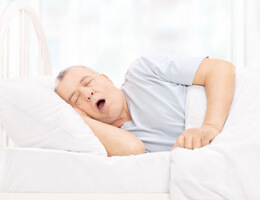Sleep Apnea Therapy – Ann Arbor, MI
Start Sleeping Soundly & Waking Feeling Rested
People who snore may not realize that annoying sound might signal a more serious issue—sleep apnea. Sleep apnea occurs when breathing is obstructed while you’re sleeping. Your breathing actually pauses repeatedly for short periods of time throughout the night, forcing your body to repeatedly wake up to restore it. We offer sleep apnea therapy in Ann Arbor, MI to help you stop snoring and wake feeling rested.
The Types of Sleep Apnea

There are two different types of sleep apnea. Central sleep apnea is neurological in nature; the brain fails to send the signal that regulates steady breathing while a person is asleep.
The second type is called obstructive sleep apnea, or OSA. This is the more common type, and it is caused by the relaxation of the soft tissues in your mouth and throat, including your tongue. While relaxed, this tissue may fall back and block your airway.
Who’s at Risk for Sleep Apnea?

Anyone at any age can suffer from sleep apnea. In fact, even young children have been known to have OSA. Nevertheless, this medical condition happens more often among adults who are middle-aged and older. Sleep apnea also is more prevalent among men than women. Some other risks for sleep apnea include:
- Being a smoker
- Obesity
- Overdrinking
- Nasal congestion
- Regular use of sedatives
The Symptoms of Sleep Apnea

Sleep apnea’s most common symptoms include chronic daytime fatigue, frequent waking, and of course, snoring. In addition, many people also may experience a morning headache or sore throat, moodiness, irritability, depression, and difficulty concentrating.
What Are the Consequences of Sleep Apnea?

Unfortunately, sleep apnea can exacerbate or even lead to a number of serious health issues. Researchers have found a link between OSA and high blood pressure and heart disease. Why? Because without enough oxygen in your blood, your heart must work harder and pump more blood in order to deliver an adequate supply of oxygen to your body. As a consequence, the blood pressure rises and heart disease may ensue.
Other diseases associated with sleep apnea include diabetes and stroke. In addition, the daytime sleepiness that is common for OSA may increase your likelihood of falling asleep while driving. In fact, people with sleep apnea are 5X more likely to be involved in auto accidents than people who sleep normally.
How We Can Treat Sleep Apnea

In Ann Arbor, sleep apnea therapy provided by Dr. Olsen involves a custom oral appliance that will create space in your mouth and allow you to breathe easily during sleep once again. Called a nightguard, this comfortable oral appliance shifts your lower jaw forward slightly in order to prevent your tongue and the soft tissues in your throat from obstructing your airway. For many people with sleep apnea, this appliance proves to be much easier to use than a CPAP machine.
Want to once again get a good night’s sleep? Does your spouse complain about your snoring? Do you worry that your sleep apnea may lead to more serious health problems? With sleep apnea treatment in Ann Arbor, Dr. Olsen can reduce snoring annoyance, improve the quality of your sleep, and help prevent health issues associated with sleep apnea. To start getting the rest you deserve, contact us today.
Understanding the Cost of Sleep Apnea Treatment

Here at our practice, Dr. Olsen understands that sleep apnea can be a debilitating condition – but it shouldn’t hurt your wallet, too! That said, it’s important to understand the factors that affect the cost of treatment, how insurance plays a role, and how treatment can ultimately improve your overall health. Our team is happy to work with you each step of the way to ensure that you aren’t just receiving the life-changing sleep apnea treatment you deserve, but also at a price that’s fair. Continue reading to learn more or contact our office today for additional assistance.
Does Dental Insurance Cover the Cost of Sleep Apnea Treatment?

In some cases, insurance can be used to cover the cost of sleep apnea treatment, but it depends on the plan’s specific details, as well as the nature of the treatment. Remember, dental insurance is designed to prevent long-term, costly problems from developing in the future; and sleep apnea has the potential to cause these very types of issues. It’s always going to be worthwhile to seek treatment. In any case, please don’t hesitate to contact our team if you have specific questions concerning the details of your insurance plan and if it’s possible for you to use it throughout your sleep apnea treatment.
Factors That Affect the Cost of Sleep Apnea Treatment

There are several different factors that can impact the cost of sleep apnea treatment in Ann Arbor. During your consultation, we’ll walk you through all of your treatment options based on your individual diagnosis and answer any questions you have about your oral appliance. Generally, the two primary contributors that will determine how much you’ll be paying out-of-pocket include what type of treatment method you’re opting for (which also has to do with the severity of your sleep apnea), and how much your insurance plays a role. In many cases, we can give you a rough estimate when you come in for your consultation after you’ve received your diagnosis.
Treat Your Sleep Apnea Now to Improve Your Health

It might seem like a bit of a hassle to diagnose your sleep apnea and then follow up with treatment – plus the financial implications might be making you hesitate, too. You should know that it’s always going to be worthwhile to seek treatment for sleep apnea. If left unaddressed, the condition has the potential to impact your bodily health, leading to more severe conditions like stroke, heart disease, diabetes, hypertension, depression, and other problems. Needless to say, these conditions aren’t just draining, but they can also be costly to treat. You’d be doing your body and wallet a favor by seeking sleep apnea treatment sooner rather than later!
Making Sleep Apnea Treatment More Affordable

Here at our practice, we firmly believe in helping our patients achieve affordable, life-changing sleep apnea treatment. That’s why in addition to accepting multiple dental insurance plans, we partner with CareCredit; this third-party financer allows qualifying patients to break up their total cost of care into affordable, monthly installments with low or no interest rates.
Sleep Apnea (Obstructive Sleep Apnea) FAQs
Why Should I See a Dentist for Sleep Apnea Treatment?
You might naturally wonder what a dentist could do for sleep apnea, and why you’d see them instead of a sleep doctor. The fact is that most sleep apnea is obstructive, i.e. it’s caused by soft tissues in the mouth and throat obstructing the airways.
Dentists are actually experts in the upper respiratory area in order to further understand oral health, which means that they can often catch on to the symptoms of sleep apnea if you’re dealing with the condition. You probably also see your dentist more often than you do a sleep doctor, which means that they’re often a good first person to ask.
It's also worth noting that if you’re interested in treating your sleep apnea with an oral appliance, you’ll get that from a dentist anyway. This means that they’re often a perfectly reasonable first point of contact if you want to learn more about the condition.
Does Everyone Who Snores Have Sleep Apnea?
No, snoring is not a surefire sign that you have sleep apnea. There are all kinds of people who snore, and not all of them have some kind of underlying health condition that causes the problem.
Inversely, not everyone who has sleep apnea snores. While this is a symptom of the condition, it’s far from the only one—there are plenty of other ones. If you have an inkling that you suffer from this condition, you should talk to a professional about it regardless of whether you snore or not.
Can I Diagnose Sleep Apnea on My Own?
As you might have gathered, sleep apnea is a complex condition with a variety of symptoms. This means that it can be difficult to simply read a list of symptoms and diagnose yourself. While smart watches can potentially give you some insights to the quality of your sleep, they can’t conclusively prove whether you have sleep apnea. And, of course, you’re asleep when the condition is affecting you.
All of this means that there’s no way to determine whether you have sleep apnea on your own—you need to complete a sleep test to determine for sure if you have this condition or not.
Can My Dentist Diagnose Sleep Apnea?
Strictly speaking, a dentist cannot diagnose you with sleep apnea. That is to say, we don’t have the certification necessary to formally diagnose you with the condition or to prescribe you treatment for it. However, we can conduct a preliminary screening, talking to you about your symptoms and examining the soft tissues in your mouth to determine whether you seem like you could have the condition. We’ll also be able to refer you to a sleep doctor who will conduct a sleep test, at which point you can be diagnosed.
UNANSWERED QUESTIONS
Who is a candidate for oral appliance therapy for sleep apnea?
Oral appliance therapy can be an excellent solution for people who struggle with sleep apnea or chronic snoring, especially those with mild to moderate obstructive sleep apnea.
These custom-made devices resemble mouthguards or orthodontic retainers and work by gently repositioning the jaw or tongue during sleep to help keep the airway open.
You may be a good candidate for oral appliance therapy if:
- You have mild to moderate obstructive sleep apnea
- You snore loudly but do not have severe sleep apnea
- You cannot tolerate or consistently use a CPAP machine
- You prefer a non-invasive, comfortable, and travel-friendly treatment option
A consultation with your dentist or sleep specialist is the best way to determine if oral appliance therapy is right for you.
How do healthcare providers ensure the effectiveness and comfort of oral appliances for sleep apnea?
The effectiveness and comfort of oral appliances for sleep apnea depend on careful customization and ongoing monitoring.
Your dentist begins by evaluating your mouth, jaw, and airway and taking detailed impressions or digital scans. This ensures the appliance is custom-designed to fit your unique anatomy and maximize airflow while minimizing irritation.
After delivery, regular follow-up appointments allow your dentist to monitor your progress and make adjustments as needed, such as realignment or relining of the appliance. These visits help ensure the device continues to fit properly as your oral health changes over time.
This combination of personalized design and ongoing care helps you achieve comfortable, effective treatment and better, more restful sleep.

